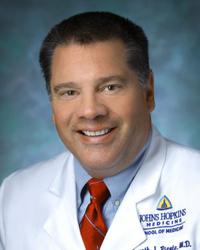
Ken Pienta, MD
Medical Oncology
5 of 5 stars
35 Ratings, 12 Reviews31 Insurances Accepted
View allAbout
Professional Titles
Primary Academic Title
Background
Leadership Title
Videos
Additional Academic Titles
Contact for Research Inquiries
Research Interests
Research Summary
PubMed
Selected Publications
Patents
Honors
Memberships
Professional Activities
Locations
- Viragh Pharmacy
- 201 North Broadway Street, Viragh BLDG 5th FL, Baltimore, MD 21287
- phone: 410-955-8964
- fax: 410-367-2194
Expertise
Education
Johns Hopkins University School of Medicine
Fellowship, Oncology, 1991University of Chicago Medicine
Residency, Internal Medicine, 1988Johns Hopkins University School of Medicine
Medical Education, MD, 1986Insurance
- Aetna
- Amerigroup District of Columbia
- AmeriHealth Caritas District of Columbia
- Beech Street
- Blue Cross Blue Shield Federal Employee Program (FEP)
- CareFirst
- Cigna
- Evernorth Behavioral Health
- First Health
- Geisinger Health Plan
- HealthSmart/Accel
- Humana
- JAI Medical Systems
- Johns Hopkins Health Plans
- Kaiser Permanente
- KeyCare
- Maryland Physicians Care
- Medicaid Maryland
- Medicare Maryland
- MedStar Family Choice District of Columbia
- MultiPlan
- Pennsylvania's Preferred Health Networks (PPHN)
- Point Comfort Underwriters
- Private Healthcare Systems (PHCS)
- Provider Partners Advantage HMO SNP Medicare Advantage
- South Central Preferred (SCP)
- Superior Vision
- TRICARE (Humana Military East)
- UnitedHealthcare
- Veteran Affairs Community Care Network (Optum-VACCN)
- Wellpoint (Amerigroup MD)
Reviews
5 of 5 stars
35 Ratings, 12 ReviewsThe Patient Rating score is an average of all responses to physician related questions on the national CG-CAHPS Medical Practice patient experience survey through Press Ganey. Responses are measured on a scale of 1 to 5, with 5 being the best score. Comments are also gathered from our CG-CAHPS Medical Practice Survey through Press Ganey and displayed in their entirety. Patients are de-identified for confidentiality and patient privacy.
- 4 out of 5 starsReviewed on 3/3/2024
Excellent
- 5 out of 5 starsReviewed on 12/3/2023
Best Doctor in the world
- 5 out of 5 starsReviewed on 11/19/2023
Both my providers are wonderful people.
- 5 out of 5 starsReviewed on 10/22/2023
Couldn't ask for better
- 5 out of 5 starsReviewed on 10/15/2023
Friendly, comforting and caring.
- 5 out of 5 starsReviewed on 10/8/2023
My provider has a perfect knowledge of his area of specialisation. He handled my medical issues with unmatchable proficiency and professional dexterity. I am indeed very happy that he's the provider I met in my first visit to Johns Hopkins in 2016. He is calm and patient. He inspires hope and confidence in the patient. He is simply great.
- 5 out of 5 starsReviewed on 9/17/2023
Absolutely the best!
- 5 out of 5 starsReviewed on 8/27/2023
Dr Pienta is one of the best doctors I've ever seen. Diane Reyes is also excellent.
- 5 out of 5 starsReviewed on 8/20/2023
I drive from out of state to be seen by Dr K. Pienta. I feel confident in allowing him to make the most appropriate decisions about my health needs. He is very knowlegeable and experienced in the field of prostate cancer.
- 5 out of 5 starsReviewed on 7/26/2023
My visit was excellent. We had a good serious conversation about my condition and treatment. Both the doctor and the nurse were very well prepared and familiar with my history and condition.
- 5 out of 5 starsReviewed on 7/25/2023
Brilliant and compassionate.
- 5 out of 5 starsReviewed on 6/8/2023
Very professional, caring and understanding.
